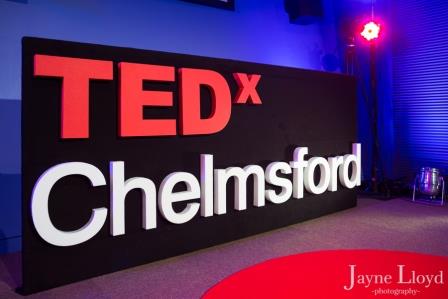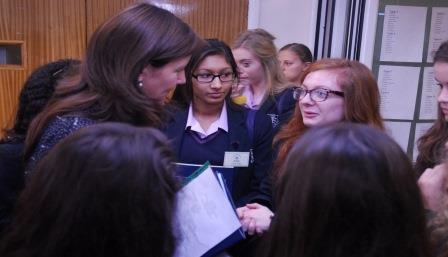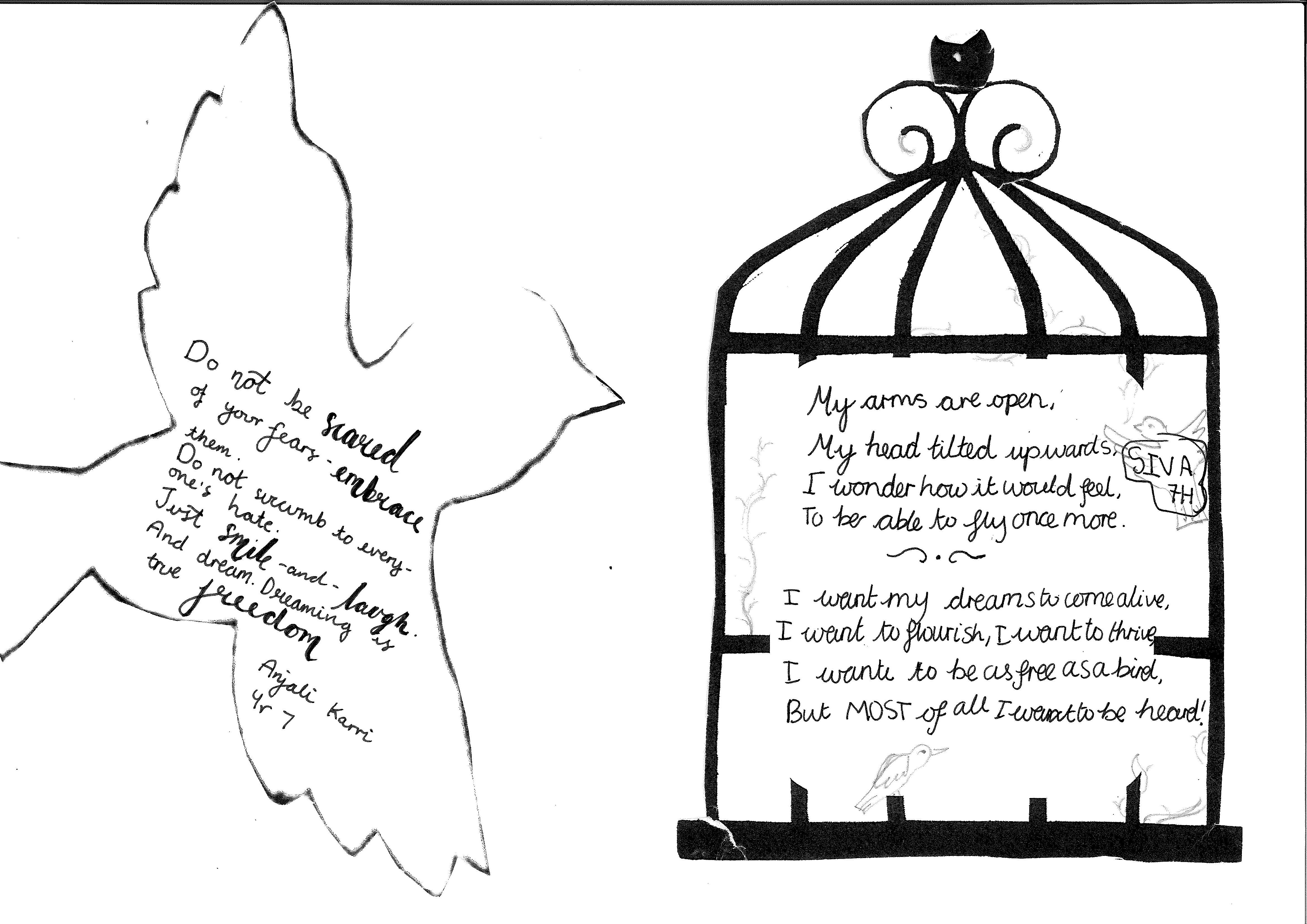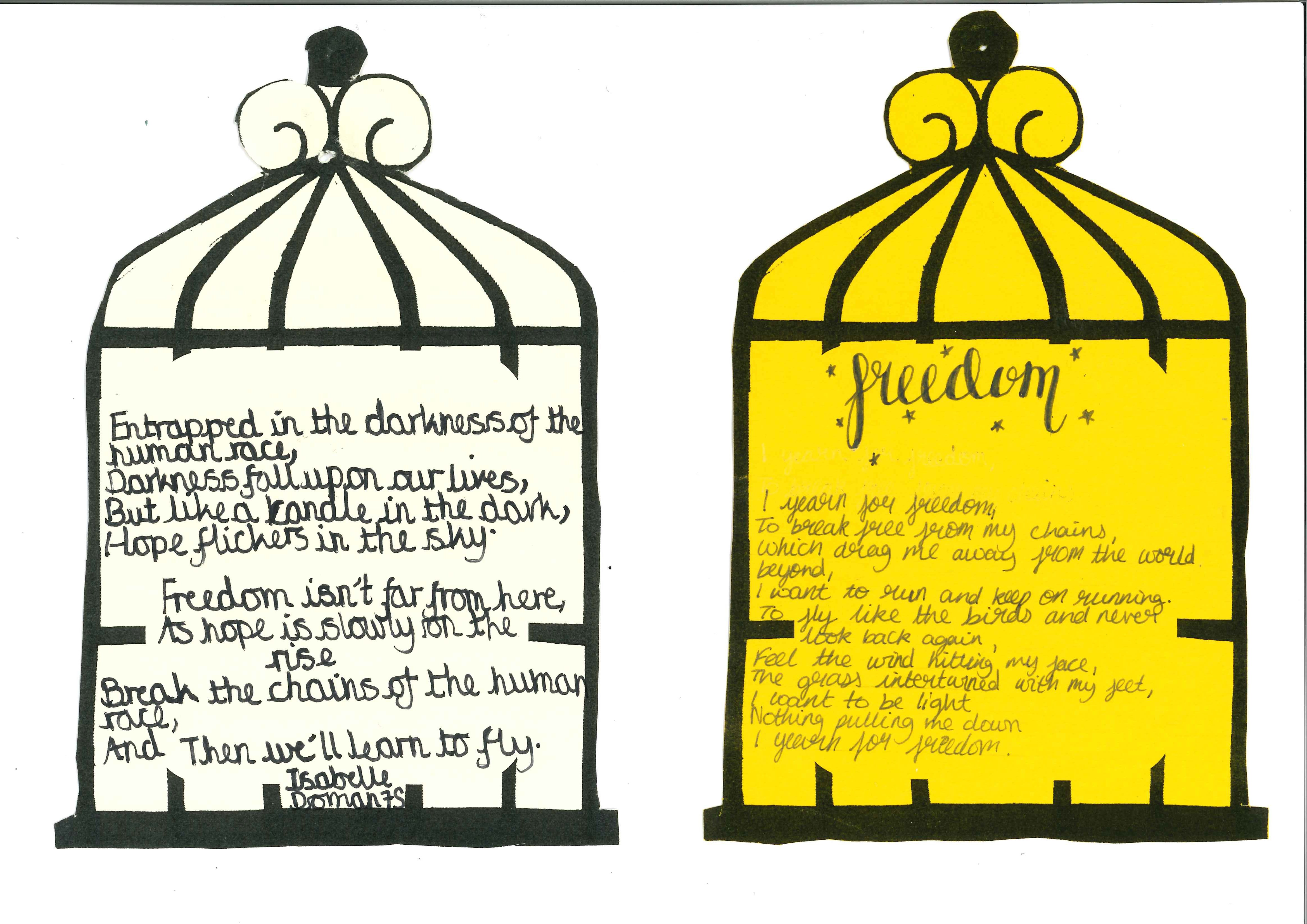Chelmsford County High School for Girls (CCHS) is a selective grammar school for girls aged 11–18 located in Chelmsford, Essex.
Schools Leadership Programme
Find Your Voice!
Our PTI Schools Leadership Programme project has focused on developing student confidence and ability to speak out, both in the classroom and beyond. After an inspirational trip to the National Coalition of Girls’ Schools (NCGS) Conference in Washington DC in 2012, the school’s Pastoral Team has driven a Find Your Voice! programme as part of our overarching vision: Developing the Leaders of Tomorrow.

From the first taster day in Year 7, girls are encouraged to become articulate as leaders of learning in the classroom and beyond. All students are encouraged to speak out and question and test out their ideas in a safe and supportive environment. Everyone is also encouraged to speak out in form time and graduate to more formal public speaking opportunities. Staff have worked hard to adapt their lessons to really encourage and make time to hear the girls speak and devise opportunities to extend this.
Some examples are:
- ‘Chocolate Club’, a Year 7 discussion group to encourage conversation
- Chat Groups to discuss ideas in Years 8-11
- Delivering form, year group and whole school assemblies
- How to speak with confidence without reading from notes; using a microphone with confidence; the art of public speaking: body language, intonation, confidence and content.
- TEDx Talks: Delivering an original talk to camera, reflecting with confidence and receiving constructive criticism. (Lailah-Tul-Anne Choudhry’s speech ‘Say It!’ can be viewed on the TEDx Talks YouTube channel https://www.youtube.com/watch?v=Tf4v3dORJWY
- Year 11 Leadership Conference and Find Your Voice! workshops
- Various debating competitions: Jack Petchey’s “Speak Out” Challenge; The Oxford Schools’ Debating Competition run by the Oxford Union; The Cambridge Union Schools Debating Competition; The English-Speaking Union

A team of Year 9 student researchers have been tasked with part of the project. They will monitor the impact of this initiative across the school and have been divided into three teams:
- Team 1 focuses on learning conversations in the classroom and have devised a research paper to see how girls speak out in class impacts their learning. For example, does the position where you sit in the classroom affect your ability and frequency to speak out in lessons.
- Team 2 looks into learning conversations outside of the classroom, examining student-led groups such, Med Soc, Philosophy of History, Year 9 Internationalism Presentations: “Where I Come From”, Primary Outreach Team, Talking to Year 13 after interview season.
- Team 3 deals with public speaking.
Girls have devised their own Find Your Voice! workshops, and have developed advice for public speaking: “Stand up straight and start your speech with a smile, then your audience will relax and actually listen to you! Find the individual in your talk...if they have a stake, they have an interest. Keep the pace. Keep it moving. Images are great...particularly with a wide age-range audience and act as a prompt that will free you from notes and liberate you from the lectern!
“In lessons: Be a leader of learning in the classroom. Develop your skills: one of them is knowing when to speak and when to listen. Don’t wait until you’re in a university interview to articulate your thoughts about a subject or intellectual idea. Get used to it now in a safe and low risk environment. When it comes to interviews, you’ll be polished and poised!”

Our Schools Leadership Programme project represents the importance we place on developing confident, gritty and articulate young women who are ready to take their place in the world. The vision supports the expectation that all girls will speak out, and accepts that there will be errors too. We have made this a low-risk venture where everyone is developing this skill and staff are modelling this too. We hope that the girls will be able to use their voices to speak for good in the world and perhaps to speak for others without a voice.

They are always reminded about using their gifts and abilities wisely for the local and global community. Most recently a Year 10 team taught themselves how to auction; they auctioned off old student art work and raised money to send two caravans to house unaccompanied refugee children in the Calais Jungle. Their amazing work is practical testimony to the power of expecting all girls to speak and speak well!
We hope encourages you to develop a Find Your Voice! programme in your school, supporting young people to speak out with confidence, to not be afraid of a microphone, and to really undertsand how powerful and practical their words can be in effecting change in the world and their own learning journey, and developing them as the Leaders of Tomorrow.
English department
On 27th September KS3 students celebrated National Poetry Day and embraced the theme of ‘Freedom’. Students read poems aloud in lessons and enjoyed discussing William Ernest Henley’s ‘Invictus’, using it as inspiration for their own poetry writing. With just a section of a lesson in which to compose a poem, students were encouraged to write ‘from the heart’ and eschew the more tentative drafting and re-drafting processes of formally assessed work, which in itself gave them a kind of creative ‘freedom’. Completed poems were displayed around the school at once, resulting in an explosion of creativity on the day.

Meanwhile, Year 10 students took part in the Jack Petchey Speak Out Challenge, an all-day workshop which developed public speaking and debating skills. One of the most significant aspects of the Jack Petchey approach to training is the way in which students are encouraged to speak passionately without notes, thereby avoiding the pitfalls of reading from a sheet of A4 or struggling to remember a learnt script. This useful and important day’s work fed in to students’ Speaking and Listening Endorsement assessments, while eight finalists across the year group competed against each other to qualify for the regional competition.

A team of students from the upper years of the school took part in the Bar Mock Trial Competition in Kent at the end of 2017, winning the heat outright and progressing on to the national final, to be held in Cardiff – a fantastic achievement by our budding lawyers. Three more students competed in the English Speaking Union Schools Competition in December, putting in a great effort though unfortunately being kept from the top spot.
Creativity continues to blossom across all year groups, with the school’s Creative Writing Society working on a year-long project to produce and publish a volume of collected work, ranging from detective fiction to lyric poetry. Meanwhile, aspiring filmmakers are in the process of producing short films for the inaugural CCHS Film Festival, to be hosted at a nearby independent cinema.
Latin department
The Latin department at CCHS has attempted to provide opportunities for students to develop their interest and understanding beyond the constraints of the curriculum, but still using their inherent enthusiasm and their skills in languages. Two ways in which the department has achieved this have been the introduction of a Classical reading group and a Linguistics Club.
The reading group operates on a fortnightly basis after school, with students provided an extract of text in translation by a Greek or Roman author to read in advance. It has been really interesting to see students' responses to the variety of texts we have explored, from Greek and Roman poetry, to historical texts, drama, philosophy and even an apparently Homeric account of the war between frogs and mice! Students are encouraged to share their thoughts on the themes, content and style of the different passages - as well as provoking academic debate and discussion, it also allows the students to engage with texts and authors they never would have encountered without such a club. These students have relished the meetings, and it has been pleasing to see them suggesting their own pieces for future sessions; evidence that the seed of wider reading has taken root.
Linguistics Club was introduced as a means of highlighting the link between all languages, both ancient and modern. Students come along and explore exercises from the UK Linguistics Olympiad, in which they are challenged to identify and apply language patterns in a language that they are highly unlikely to have met - Esperanto and Old Norse were early highlights! It has been excellent to see students enjoying this challenge, with some students entering and achieving highly in the UKLO and even applying for Linguistics based courses at university, having been encouraged to consider the links between the languages which they study, which previously they may not have considered.
